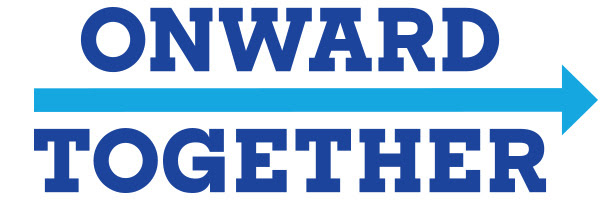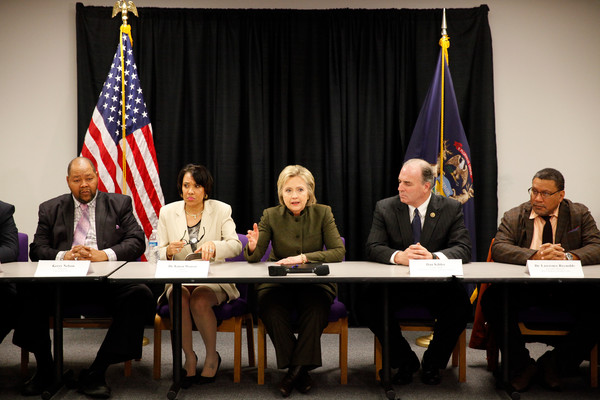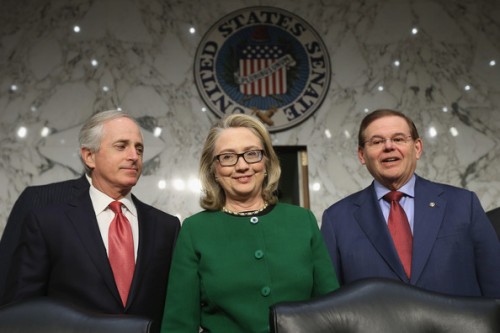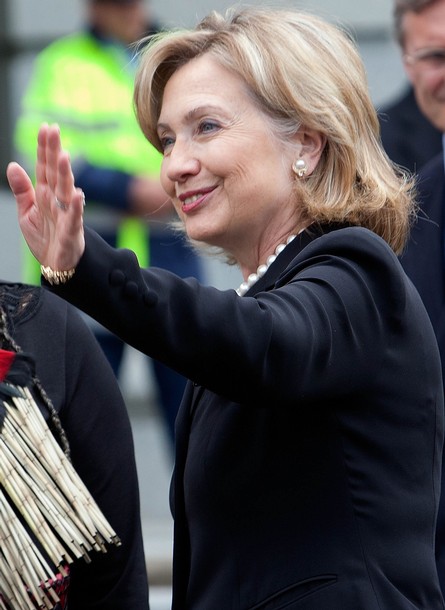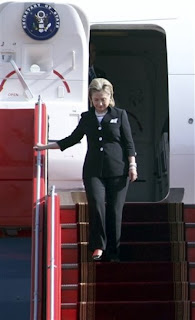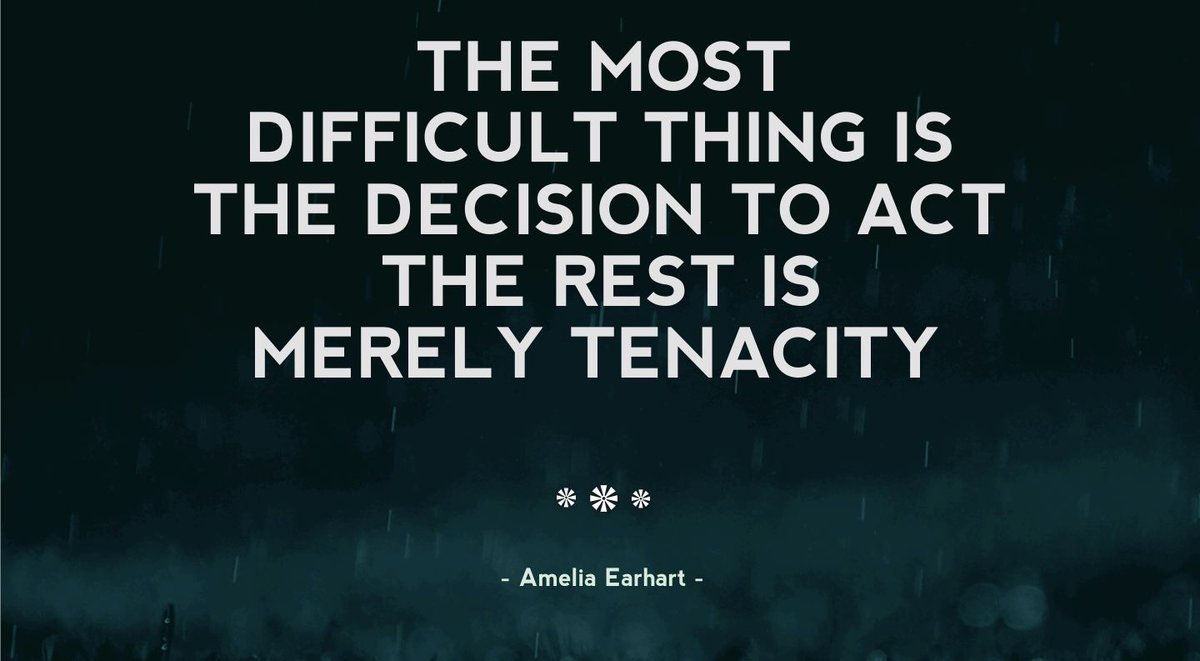Yes, there were more bilaterals last night after which she hosted the Transatlantic dinner. The snip below is from a briefing last night by a senior official providing background.
Readout of the Secretary’s Meetings With Belgian Foreign Minister Reynders, Greek Foreign Minister Avramopoulos, United Kingdom Foreign Secretary Hague, and the Transatlantic Dinner
Special Briefing
Senior Administration OfficialWaldorf Astoria HotelNew York CitySeptember 25, 2012MODERATOR: Thank you very much, and again, sorry that this evening has gone on so long, but we thought it would be worthwhile to provide you a readout on background from our Senior Administration Official. For your records, that is actually [Senior Administration Official]. We will do a brief readout of the dinner that just took place, the Transatlantic Dinner with our NATO and European partners, and then have time to take some of your questions.So with that, let me just turn it over to our Senior Administration Official.
SENIOR ADMINISTRATION OFFICIAL: Thanks, and thanks to everyone for waiting up so late. Apologies it’s so late, but the dinner went on for some time. I’ll get to the Transatlantic Dinner. Maybe I can just start with the other Transatlantic engagements, European engagements the Secretary’s had since she arrived on Sunday.
This actually began with her bilat with European Union High Representative for Foreign Policy Cathy Ashton on Sunday evening. And just briefly on that, she – the Secretary spent a good hour with High Representative Ashton covering a wide range of issues starting with Iran. The High Representative is leading the negotiations, recently had some talks in Istanbul with the Iranians, was able to report on those talks, and I think both of them concluded that there’s still time and space for diplomacy, and that effort needs to go on as we pursue both tracks – the pressure track – and I think we’ve heard from a number of Europeans in the course of the week that they’re looking for ways to increase the pressure track even as High Representative Ashton leads the way on negotiations on the diplomatic track. And we’re very serious about both tracks at the same time.
They talked about Burma, obviously, with Aung San Suu Kyi recently being in Washington and the EU having its own engagements with her, and talked about how the U.S. and the EU can coordinate on supporting democratic reforms in Burma. And then they actually spent a considerable time – amount of time on democratic reforms closer to home, which is to say across Eastern Europe. As the Secretary and High Representative were meeting, we were getting election results from Belarus – not that there was much question about how those elections would come out – and unfortunately they came out as expected, which is to say reflecting an unlevel playing field. And Secretary Clinton and High Representative Ashton talked about how we together in the U.S. and Europe can keep the pressure on Belarus and make clear that so long as there are political prisoners and so long as elections are repeatedly falling well short of international standards, then Belarus is not going to be able to have the relationship with Europe and the United States that it needs.
They also talked about upcoming elections in Ukraine, and I think it’s fair to say that we – the United States and Europe are working extraordinarily closely together when it comes to pressing for and supporting free and fair elections that are going to take place on October 28th. Ukraine is hugely important to European security and stability. We have been very clear how much we regret what we see as selective prosecutions, including the imprisonment of former Prime Minister Tymoshenko. And Secretary Clinton, High Rep Ashton agreed the U.S. and the European Union really have the same policy, which is to say that our relations with Ukraine can only really move forward when we see an end of those selective prosecutions and free and fair elections. And they talked about how we can use the time between now and October 28th to support those goals.
There are also upcoming elections in Georgia on October 1st, and once again, I think the two of them agreed how important it was for us collectively to make clear to Georgia how important it is to have a fair and transparent and competitive campaign environment. The most important thing Georgia can do for its future is to consolidate its democracy. We have respectively raised concerns about different issues on the road to those elections, and we’ve been appreciative that the Georgian Government has heard those concerns, and in most cases, taken measures to make sure that the elections that we are going to be very active in monitoring will indeed be free and fair.
And then finally, Secretary Clinton and High Rep Ashton talked about the Balkans. Catherine Ashton is leading an effort to promote the dialogue between Serbia and Kosovo. Together, we support the path to the European Union of both of those countries. We think Serbia needs to come to term with an independent Kosovo in order to move forward along that path. And it’s something the United States and European Union are working very much hand in hand on to consolidate the Balkans as part of a unified Europe.
And then this evening, the Secretary, prior to the Transatlantic Dinner, had the opportunity to meet with a number of foreign ministers, including, in particular, several whom she hadn’t had formal bilats with who are new since certainly the last General Assembly, which includes the Greek Foreign Minister, Mr. Avramopoulos; the Belgian Foreign Minister, Didier Reynders; and the very new Norwegian Foreign Minister, Espen Barth Eide. And the Secretary also met with UK Foreign Secretary William Hague.
Just very briefly with Greek Foreign Minister Avramopoulos, of course, they focused considerably on the Greek economy, and the Secretary expressed our understanding and appreciation for the great sacrifices that the Greek people are making in the reforms that have been deemed necessary to keep Greece in the Eurozone and to turn around its economy. We know how difficult those reforms are, but it’s a core American interest to see the Eurozone not just survive but thrive, and that entails also supporting Greece. And she was able to hear from the Foreign Minister the difficult budgetary cuts and tax increases and structural changes they’re making, but we were impressed with the seriousness of the effort, and I think it was useful for the Secretary to hear about the important reforms that Greece has undertaken, and for Foreign Minister Avramopoulos to hear how strongly the United States supports what Greece is doing.
With Foreign Minister Reynders of Belgium, she – Secretary Clinton thanked him for Belgium’s strong cooperation with the United States on a number of areas, including Afghanistan, where they’ve been very much involved and are – have agreed to help support Afghan National Security Forces after 2014; our cooperation on Syria and Iran, where again Belgium is a core member of the Transatlantic community, is cooperating closely with us. And they also talked about a couple of areas of particular interest not just to us, but to Belgium, which is to say Central Africa, the Congo, and the Sahel where the Belgium Foreign Minister explained what Belgium is doing to try to promote stability in those regions.
Seeing the new Norwegian Foreign Minister Barth Eide was a good opportunity for the Secretary, who had worked very closely with his predecessor, Jonas Store. She congratulated the new Foreign Minister and noted that the United States and Norway are extraordinarily close partners who work very well together. The Secretary, of course, traveled to Norway last summer, and it was a good chance for her to touch base with the brand new Foreign Minister and talk about a number of areas of common interest.
Finally, she did a bilat with Foreign Secretary Hague, mostly focused on Syria, where it was a good chance for the two of them, who have both recently seen Special Representative Brahimi, to coordinate policy on Syria. They also touched on Afghanistan and the challenge of dealing with some of these so-called green-on-blue attacks.
A lot of these themes that I’ve already mentioned, these bilats were also the subject of the Transatlantic Dinner, and I’ll end with a readout of that, which I guess went on for almost two hours. The Transatlantic Dinner, as you all know, is something we do every year at the General Assembly, meeting of European Union foreign ministers, NATO foreign ministers, as well as Macedonia and Switzerland, plus the NATO Secretary General and the High Representative of the EU. And it’s an opportunity to talk about a number of issues on the agenda of European and North Atlantic countries. They can obviously not cover everything; they cover a number of things, but I think particularly worth highlighting would be three topics – Syria, Afghanistan, and Europe and this question of democracy in Europe that I already flagged as being one of the subjects of the bilats.
And I think what is really worth stressing when I mention these topics of Syria, Afghanistan, and democracy in Europe is how much on the same page these members of the transatlantic community are. Members of the EU and NATO are really working in an unprecedented way on each of the topics I mentioned.
Again, just briefly on Syria, there was really a consensus around the table behind the approach that I know you’ve heard about that we’ve been taking in terms of supporting the opposition and trying to coordinate the opposition so that when the Assad regime does fall, as we believe it will, there will be something in place that can provide stability, efforts to respond to the huge humanitarian crisis; of course, Turkey is present at this meeting, was able to speak about the challenges they’re facing with refugees and preparing for a post-Assad Syria and keeping the pressure on the regime.
On Afghanistan, as in previous years, the Secretary was able to thank our European allies and partners for all the contributions they have made to our efforts in Afghanistan. This was the first meeting of this group since the Chicago Summit where important decisions were made on the milestone towards Afghan lead in 2013, and then the full transition by the end of 2014. And to follow up on some of the pledges made, our belief, as you know, is that the key to transition and successful transition in Afghanistan is training, and that requires trainers and it requires funding. And we were very pleased at all of the contributions made by European and other allies in Chicago towards ANSF funding after 2014. And the Secretary reiterated the importance of continuing to finance that project and to contribute the security force assistance teams that are needed to make this a success.
I think it’s worth stressing the Secretary made clear, and I think others around the table also made very clear, that notwithstanding some adjustments to the approach in Afghanistan to deal with these so-called insider attacks, the goal and the strategy and the timeline in Afghanistan remain absolutely unchanged. And Secretary General Rasmussen made that perfectly clear as well. What leaders agreed first in Lisbon and then complemented in Chicago is very clear and has not changed, and again, I can – I think I can say that every single minister on the table who spoke about it reiterated their commitment to the same goal, strategy, and timeline, and their commitment to doing what they can to support those goals.
Finally, and I think it’s really worth stressing, the discussion on democracy in Europe was important. This group gets together, and the world in which we live so often finds itself talking about Libya or Syria or Iran or Afghanistan, but there’s still some concerns in Europe to this group. And the Secretary herself highlighted her personal concerns about some of the upcoming elections that I already mentioned – Ukraine and Georgia, the highly imperfect election that took place in Belarus, and also the climate for democracy and human rights in Russia. And the Secretary noted a number of steps taken recently in Russia that aren’t pointing in the right direction where transparency and democracy are concerned.
And we’ve already raised in other fora our concerns about the new NGO law that requires registration of foreign agents, the increased fines for protests, some selective cases of prosecution, and now most recently, a new draft law on treason which would widen the definition of treason, and then of course the Russian decision to ask our USAID Office to cease its activities in Russia. And the Secretary reiterated our regret of that decision and our belief that USAID has accomplished a lot in Russia, and our commitment to carry on as we can in supporting those in Russia who want to see a free and fair and democratic Russia.
So that’s really the highlights, I think, of the Transatlantic Dinner and the bilat….








